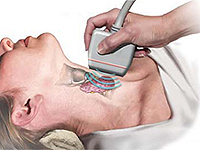Thyroid gland plays a crucial role in metabolism and the implementation of other physiological functions of the body. Millions of people suffer from the diseases of the thyroid gland, without even suspecting. Learn more about the symptoms and diagnosis of thyroid diseases.
Content
Thyroid
The thyroid gland is an essential element of the endocrine system that produces hormones necessary for the implementation of the physiological functions of the body. Hormone generated by the thyroid gland (thyroxine) establishes the rate of functioning of the body. The thyroid gland is located in the front surface of the neck and attached to the bottom of the larynx and to the top of the trachea. The thyroid gland is Greek called Glandula Thyreoidea (thyroid) and a poet in all terms that concern it, the root is used in medicine «Tireo-».
The thyroid gland has a rather small size and shape of a butterfly, since it consists of two rounded parts (fractions), which are connected with a narrow jumper. The work of the thyroid gland mainly depends on the content of iodine, so people living in the regions where low iodine concentration in water, doctors recommend taking iodine additives and use iodine-rich. Goiter - a disease in which the thyroid gland is increased. The level of thyroxine is regulated by another hormone produced by the pituitary.
Thyroid cancer
Thyroid cancer easy to diagnose. The symptoms of the thyroid cancer (sore throat and neck, pain when swallowing and breathing) are sometimes attributed to infectious diseases, so some cases do the diagnosis makes it difficult. Every year, doctors register more than 11,000 cases of thyroid cancer, mainly among women.
The risk of this disease is most exposed to women older than 30 years, and especially menopausal age. The probability of recovery is more than 95%, subject to the diagnosis of the disease at an early stage. Thyroid cancer may look like papillar or follicular cancer, and for the treatment of the disease, the affected stake of the gland is deleted. Papillar thyroid cancer is more common and it is easier to treat.
Other thyroid diseases
 Other common diseases of the thyroid gland include Basedov disease, autoimmune thyroiditis and nodules of thyroid gland. Basedova disease is caused by excessive stimulation of thyroid cells, resulting in iron produces excessive amounts of hormones. An autoimmune thyroiditis caused by the accumulation of white blood cells (leukocytes) and liquid inside the thyroid gland. In this case, the disease occurs gradually the destruction of the thyroid gland. With an increase in one of the thyroid stakes, multiple nodules appear on it.
Other common diseases of the thyroid gland include Basedov disease, autoimmune thyroiditis and nodules of thyroid gland. Basedova disease is caused by excessive stimulation of thyroid cells, resulting in iron produces excessive amounts of hormones. An autoimmune thyroiditis caused by the accumulation of white blood cells (leukocytes) and liquid inside the thyroid gland. In this case, the disease occurs gradually the destruction of the thyroid gland. With an increase in one of the thyroid stakes, multiple nodules appear on it.
Millions of people suffer from the diseases of the thyroid gland, without even suspecting. Most often women become victims of such diseases. Iodine deficiency in the body is not the only cause of thyroid disease. Basedova disease and autoimmune thyroiditis caused by antibodies. Symptoms of thyroid diseases are easy not to notice or confused with the symptoms of anxiety syndrome. As a result, many diseases of the thyroid gland are not diagnosed and not treated and treated. Most of the thyroid diseases are caused by a decrease in or increasing the activity of the thyroid gland. The normal functioning of the thyroid gland is called eutheyosis.
Increased activity of the thyroid gland: hyperthyroidism - a disease in which the thyroid gland produces excessive amounts of hormones. This leads to an increase in metabolism, which causes a sharp weight loss, the occurrence of the feeling of heat and abundant sweating. Symptoms of hyperthyroidism: hand shake, irritability and rapid heartbeat. In women, patients with hyperthyroidism, the duration and intensity of menstruation decreases.
Reduced thyroid activity: symptoms of hypothyroidism - fatigue and decay. In women, patients with hyperthyroidism, the intensity of menstruation increases. Clumsiness and forgetfulness, dry skin and constipation often accompany this disorder.
Symptoms of thyroid disease
Symptoms of thyroid disease appear in women, starting with puberty and up to the climax. In essence, diseases or disorders of the thyroid gland can stimulate premature sexual maturations or, on the contrary, lead to its delay. Since the increased or low activity of the thyroid gland may affect ovulation, women with fertility problems may occur in women with diseases, namely, temporary infertility.
Symptoms of thyroid disorders manifest themselves in 5 - 8% of women after the child's birth. Thyroid disease often can cause premature climax. The symptoms of the high activity of the thyroid gland are often confused with preclumatic symptoms.
Symptoms of reduced activity of the thyroid gland: dry skin, nail fragility, muscle pain and spasms. The insufficient activity of the thyroid gland may be accompanied by depression. Approximately 20% of chronic cases of depression are associated with insufficient production of thyroid hormones. Treatment of thyroid diseases requires a properly selected dose of drugs. The lack of thyroid hormones can lead to an increase in blood cholesterol pressure. On the other hand, excess hormones increases the likelihood of reduced bone density and osteoporosis.
Diagnosis of thyroid disease
 With suspected thyroid disease, a complete and comprehensive medical examination is carried out. The doctor performs the palpation of the neck in order to detect the seal or increase the thyroid gland.
With suspected thyroid disease, a complete and comprehensive medical examination is carried out. The doctor performs the palpation of the neck in order to detect the seal or increase the thyroid gland.
Also prescribe the ultrasound of the thyroid gland, blood tests and a scintigraphic study of the thyroid gland. Scintigigraphic study of the thyroid gland is performed to detect nodule formations and for measuring the size of the gland.
The ultrasound of the thyroid gland is used to determine the density of nodule formations - whether they are filled with liquid cysts or solid bodies.
These surveys help accurately determine the size of the novel thyroid formations, which helps with aspiration biopsy. Aspirational diagnostic puncture of the thyroid gland is performed to take fabric samples in order to diagnose diseases. Sometimes children are born without thyroid gland. In this case, it is necessary to proceed to the treatment of this defect to prevent violations of the growth and development of the child.
Hormones thyroid gland
There are two main hormones produced by the thyroid gland - thyroxine and triiodothyronine. Hormones of the thyroid gland play a crucial role in certain physiological processes, such as the process of growth and metabolism, as well as in the process of cell differentiation. Thyroid gland also produces Calcitonin hormone. Parasitovoid iron produces parachitoid hormone. These hormones regulate calcium homeostasis and phosphorus in the body and affect the physiology of bones.









